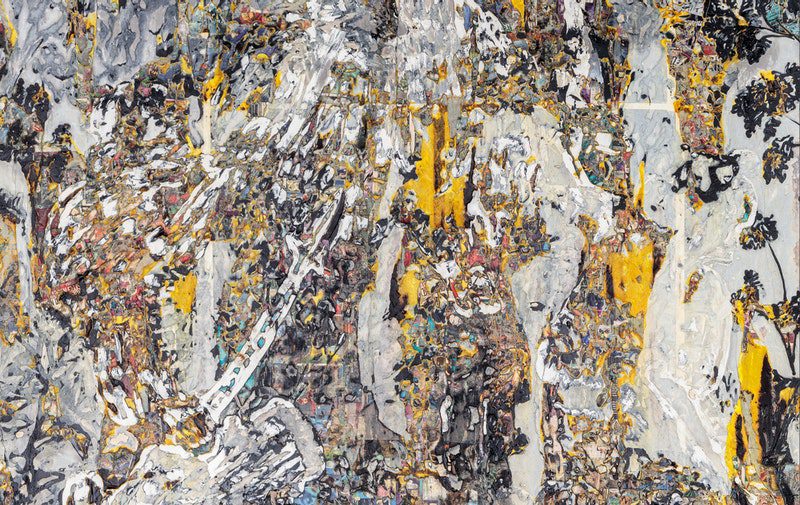Serralves Foundation , Porto, Portugal
26 Nov 2021 - 19 Jun 2022

© Mark Bradford Courtesy the artist and Hauser & Wirth Photo: Joshua Whit
Mark Bradford (Los Angeles, 1961) is acknowledged as one of the names that has best defined painting in the last two decades, conceiving his own pictorial language to express universal themes such as the distribution of power within societal structures and its impact on the individual, and the relationship between art and community engagement.
The ‘social’ in Bradford’s work is rendered through his choice of materials. From a third-generation hairdresser, Bradford worked at his mother’s salon in Los Angeles for many years, before alighting on the possibility of using permanent wave endpapers as a material in his artwork. Using everyday materials and tools from the aisles of the hardware store, he has created a unique artistic language. Frequently referred to as ‘social abstraction’, Bradford’s work is rooted in his understanding that all materials and techniques are embedded with meaning that precedes their artistic utility. His signature style developed out of his early experimentation with endpapers, the small, translucent tissue papers used in hairdressing; he has since experimented with other types of paper, including maps, billboards, film posters, comic books, and ‘merchant posters’ that advertise predatory services in economically distressed neighbourhoods. Through his rigorous physical approach to the material presence of painting, Bradford has been addressing powerful issues of our time, including the AIDS epidemic, the misrepresentation and fear of queer identity, systemic racism in America and more recently the COVID-19 crisis.
This first exhibition of the artist in Portugal, focused on Bradford’s artistic production of the last three years, presents a body of works created during and immediately preceding the COVID-19 pandemic. The exhibition mirrors upon this moment in history, reacting to growing racial and social tensions in the USA and in the world. In the artist’s words ‘the exhibition will be focused on the work that I have been doing during a moment of crisis; as an artist, the moment that we are going through right now is so special, that I want to be able not to enjoy it, but to make the best out of it and to show what an artist does in a moment of crisis’. Bradford, for whom ancient mythology has always been a consistent source of inspiration, created for the exhibition a new series of paintings, tapestries and works on paper inspired by the medieval Unicorn Tapestries (The Hunt of the Unicorn), from The Netherlands c. 1500, suggesting a parallel between current times and the Middle Ages (medieval art fell victim to plague, that most medieval of dangers). The exhibition title, ‘Agora’, has a double meaning in Portuguese: the first one refers to the Greek agora, the public space, and the birth of democracy; the second meaning is ‘now’. This simple word encapsulates what the exhibition endeavoures to capture, the birthplace of something, a space for reflection and discussion of the now, focused on Bradford’s work, turning to the medieval period as a resonant metaphor for contemporary conflicts and social tensions.
This exhibition is organized by the Serralves Foundation, curated by Philippe Vergne, Director of the Museum, coordination by Filipa Loureiro, curator.